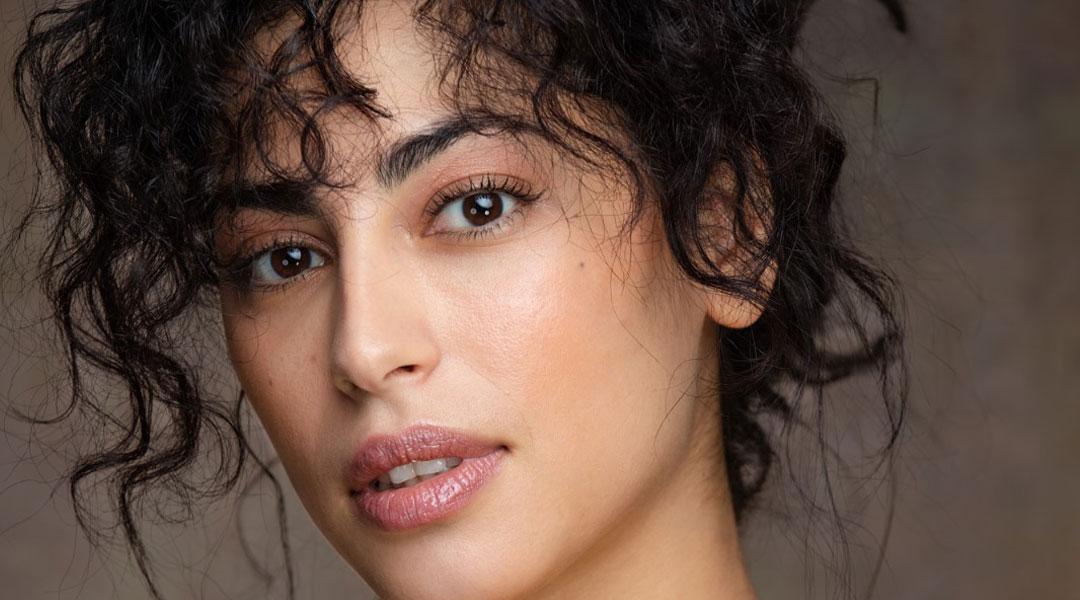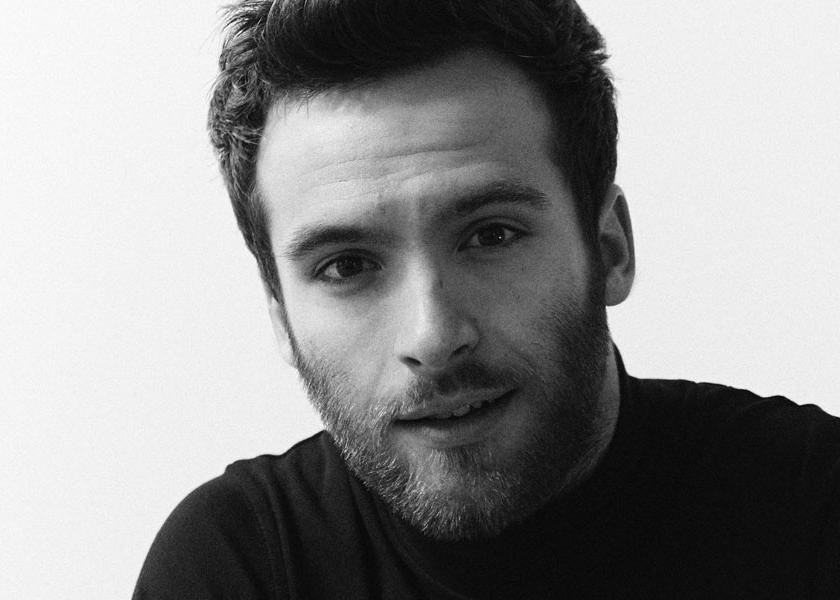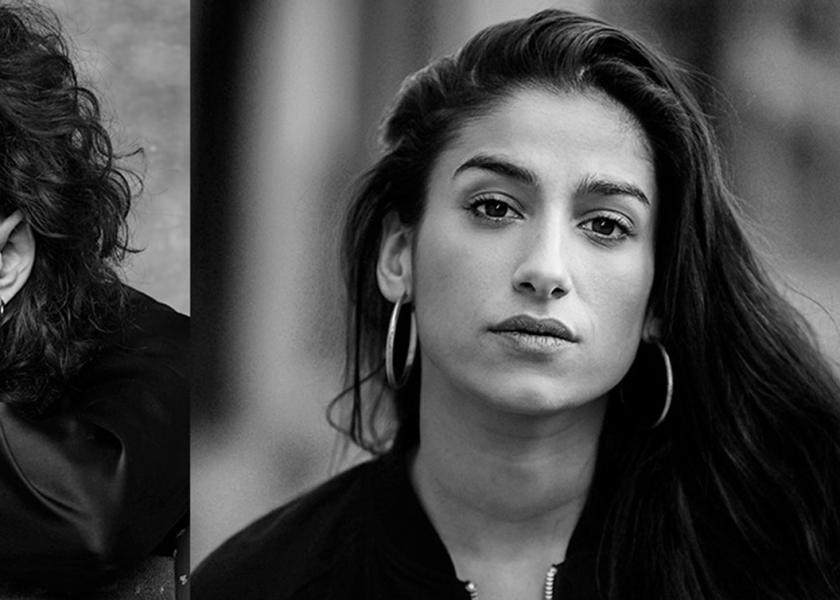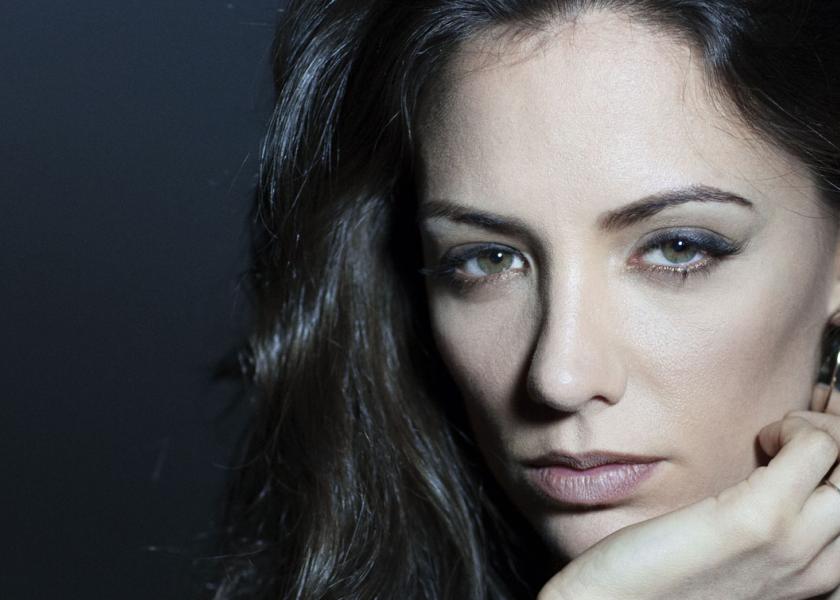Mina El Hammani
The girl who wanted to be an actress

Actress Mina El Hammani, who will return to the Mérida International Classical Theater Festival this summer to play Helen of Troy in ‘The Troyan Women,’ has been awarded the 2025 Young Talent Talía Award. Even though she came to fame thanks to television, her relationship with theatre, the place where she has wanted to be since she was a child and where she feels most comfortable — and least restricted — now, has always been remarkably close.
At the tender age of seven, Mina El Hammani (Madrid, 1993) realised she wanted to be an actress: “Realising what you want to do when you’re older at such a young age is the best luck you can have”. A kind of revelation, “something divine” she assures us, that forged the path she would follow. After taking part in series like El Príncipe or Servir y proteger, Mina landed the series that propelled her to fame: Elite. “I’m crazy about it,” she admits. Her face became known worldwide and her parents, both immigrants from Morocco with a routine that is a far cry from the world their daughter was starting to live in, helped her keep her feet firmly on the ground. In fact, her mother — her father passed away four years ago — still does this: “The conversations I have with her about my profession are always very down-to-earth.” Like the one they had when Mina got Luis Luque’s call about taking part in her first big theatre production: Dentro de la Tierra, at the Centro Dramático Nacional. “Theatre has always been there,” confesses Mina, who feels more comfortable onstage than in front of the cameras, in part because stereotypes are less prevalent. She then made her debut at the Mérida International Classical Theater Festival as Yocasta in the play Edipo (A través de las llamas), where she’ll return to play Helen of Troy in The Troyan Women (13-17 August). She will attend such a distinguished event with her recent Young Talent Talía Award —sponsored by Iberia—.
As a child, you asked your mother to sign you up for theatre. Where do you think that early passion for acting came from?
At the age of seven, I attended a casting call, and I understood it as a game where I could play at being someone else or experience other situations. That left its mark on me. Luckily (because I wouldn’t have wanted to work at such an early age) my mother didn’t take me to the final, so I asked her to sigh me up for theatre lessons at school. She didn’t do that either; I guess she was afraid of me getting into that world. Now I remind her of this often. I always advise mothers to sign up their kids for theatre if they can, not with a professional career in mind, but rather because it gives you some really necessary tools for life.
And how did your parents, with a life so far removed from what you’re experiencing, take your rise as an actress?
My father passed away four years ago, and I think he was very proud of everything I had achieved. But to be honest, my mother isn’t very aware, and that’s wonderful. I remember the first time Luis Luque called me to tell me: “Mina, the part in Dentro de la Tierra is yours.” I couldn’t believe it; I rang my mother to tell her I was going to perform at the CDN [Centro Dramático Nacional]; and she replied: “What’s that, the neighbourhood theatre?”
“I always advise mothers to sign up their kids for theatre if they can, not with a professional career in mind, but rather because it gives you some really necessary tools for life”
You shot to fame with the series Elite, which turned into a talent pool. But what does talent mean to you?
For me, talent is the commitment, the responsibility, the desire to do, the desire to tell, and the desire to share with the audience. I think everyone is talented, but you need to tap into it. For me, realising that I wanted to be an actress when I was seven made the path easier for me, in a way, because I knew the steps I had to take and that’s wonderful.
Despite your success in film and on TV, you’ve never lost sight of theatre. Why? Why is theatre special to you?
At the theatre, you can spend a lot of time rehearsing, researching the character, and that’s really valuable to me. You also feel close to the audience, that absolute “here and now” feeling. And, above all, the nerves… The bodily feeling is different because you’re not allowed to fail; this awakens a kind of third eye, even if it is unconsciously. I greatly admire people who do theatre, and I've been lucky enough to work with the greats, who I’ve learnt a lot from. And I love the handcrafted side of theatre, being aware of it and being part of the team because it seems incredible to me how they make the play possible.

Mina El Hammani will star in ‘The Troyan Women’ at the next Mérida International Classical Theater Festival. © Javier Mantrana
This summer, you’ll return to the Mérida International Classical Theater Festival to take part in The Troyan Women alongside Isabel Ordaz or María Vázquez. How do you face that?
I’m really excited. Just yesterday I had the photoshoot for the posters, and now I’m going to print the script (laughs). I really fancy delving into the character of Helen of Troy. I believe she will stay with me forever. I greatly admire Carlota Ferrer, and I’m going to learn a lot from my co-stars. I’m a fan of Isabel Ordaz! Also, this year will be incredibly special because the last time I was in Mérida was after the pandemic and there were fewer seats. Nevertheless, I have a remarkable memory: the rustle of fans before stepping onstage… It gave me goosebumps.
How did you feel when you were told you were going to receive the Young Talent Talía Award?
Incredibly grateful. I also thought how lovely it is for them to think about this new generation of children of immigrants who dream of becoming artists and getting involved in Spanish culture. I didn’t have any role models I could identify with growing up, and now thinking that girls can do that with me and believe that they can also become actresses makes me feel extremely proud. There’s a long way to go, but we need to take steps, and I love to be part of that evolution.
“I didn’t have any role models I could identify with growing up, and now thinking that girls can do that with me and believe that they can also become actresses makes me feel extremely proud”
Because of your roots, do you feel a particular responsibility when representing the Muslim or Arab community?
With my work, I try not to get pigeonholed, but this is a conversation that transcends beyond me. Since she’s called Mina El Hammani, she’s only going to play Arab roles… No, man, let’s go beyond that because reality is different. People need to be aware that just like there’s a Spanish actress called Mina —I was born in Hospital de La Paz—, there will be a Spanish lawyer called Halima. I want to raise my voice, but I also want the process to occur naturally.
For an actress like you, how hard is it to move away from stereotypes? Has it somehow turned into a personal challenge?
You see, I feel like my profile is more restricted in the audiovisual world than it is in theatre. Now I’m going to play Helen of Troy at the Mérida Festival and that’s incredible. I’ve experienced frustration, thinking: why don’t they want me to play a character called María? But I can’t blame myself. In fact, it’s good to get asked these types of questions, but producers, directors, and scriptwriters should also be asked. I also want to say that if there’s an Arab character that will allow me to explore something new, I will do it; the problem is when you receive roles that always follow the same patterns. That’s why I set up my own production company [Quiet Producciones], to tell other kinds of stories. I’m also not going to wait around for those characters to come to me, right?
And what has your experience as a producer been like?
The idea of setting up a production company came about during the pandemic. I was stuck at home in lockdown, and I couldn’t stop thinking. I got together with my associate [Candela García], who is wonderful, and I told her: “I want to tell the stories of real women, of any age and without limitations.” Shying away from clichés was my main motivation. The productions and coproductions that we have made until now have followed that path and have made me incredibly happy.


